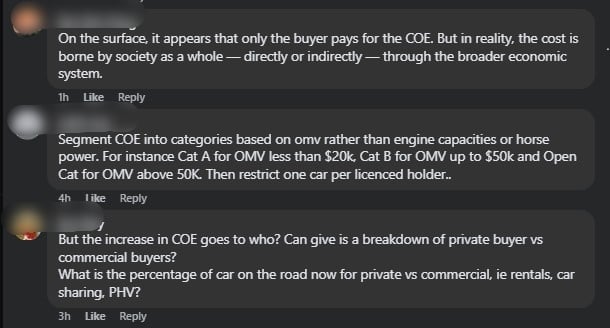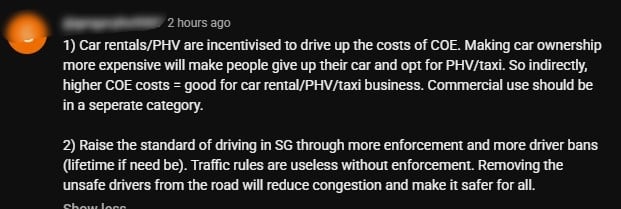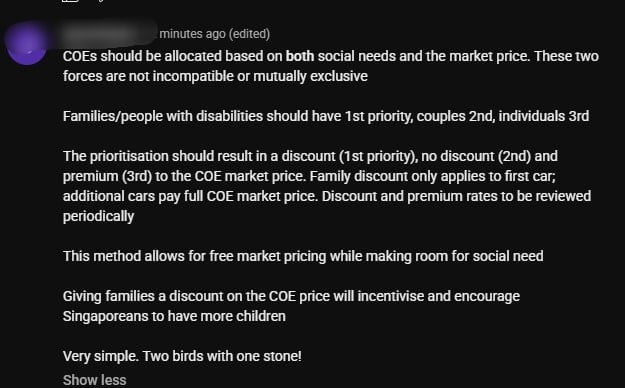Senior Minister Lee Hsien Loong has defended Singapore’s longstanding Certificate of Entitlement (COE) system, calling it an effective mechanism to allocate scarce road space despite mounting calls for reforms to make it cheaper or more socially targeted.
Speaking during a dialogue at the 69th Economic Society of Singapore (ESS) Annual Dinner on 15 July 2025, Lee responded to questions about whether the system could be adjusted to benefit specific groups, such as families with young children or people with special mobility needs.
‘No easy way to make it cheap and fair’
Moderator Euston Quah, President of ESS, asked Lee whether COEs should be made more affordable for certain drivers who may have greater need for a car.
Lee was clear in his response: the existing system is intended to manage the country’s limited road space through market demand and supply, and any attempt to engineer it too finely to meet individual needs would fail.
“There’s really no easy way to make something which is valuable be distributed fairly, and at the same time, very cheap,” Lee said.
Lee elaborated that tailoring COEs based on personal circumstances would create excessive complexity for policymakers.
He listed examples: “How many kids you have, how young they are, whether you’ve got somebody disabled in the family, whether you have an elderly parent, whether your job requires you to travel extensively—these are very difficult to assess fairly.”
According to Lee, designing a system to manage all these variables would likely collapse under its own contradictions.
COE as a proxy for road space
Lee described the COE as a proxy for Singapore’s limited road space. Its price rises and falls according to demand from prospective vehicle owners, ensuring that road congestion remains manageable.
The Government has adjusted the supply where possible. Lee noted that more COEs have already been issued to expand supply, acknowledging that this is one lever to moderate prices.
“If you want the price to be lower, then you must put out more COEs, which is what the Government is now doing. We took from the future. We are putting out 5 per cent, 10 per cent more, and therefore the supply is higher,” he explained.
The Land Transport Authority (LTA) announced that it would release up to 20,000 additional COEs across all five vehicle categories over the next few years, starting from February 2025.
Despite these measures, Lee cautioned that the core challenge remains unchanged: managing the demand for cars on limited road space.
He argued that some methods, such as Beijing’s lottery system for licence plates, would not suit Singapore’s needs.
No entitlement to cars
Pressed further by Quah on whether there should be concessions for special groups, Lee emphasised that while Singaporeans are entitled to affordable and efficient transport, there is no guarantee for car ownership.
“I can guarantee every Singaporean affordable, convenient transportation. I cannot guarantee every Singaporean an affordable car. It is different from HDB houses. Every Singaporean household can get one. But cars, no. Transportation, yes,” Lee said.
Lee suggested that for special groups, direct financial support makes more sense than adjusting COE prices.
“For example, if you have a child, it is better that I give you a bigger baby bonus rather than a cheaper COE. You can use that to buy a baby seat or help pay for a car,” he said.
He warned that indirect measures could lead to unintended loopholes and inefficiencies.
On trade and tariffs: Lee suggests protectionism may persist
The dialogue at the ESS dinner also covered broader economic challenges, including the United States’ growing protectionism.
Lee warned that the world may not return to the open trade norms that existed before 2 April, when President Donald Trump unveiled a new reciprocal trade policy.
“Once tariffs are in place and new businesses grow around that protection, they become very hard to remove,” he said.
Lee noted that then-President Joe Biden did not reverse Trump’s tariffs on China during his first term, showing how entrenched such policies can become.
He stressed that although the US has taken a more transactional approach to trade, countries that value free trade must continue to work together.
Lee highlighted the World Trade Organisation’s importance, despite its flaws.
He noted that the US’s disengagement from the WTO system could weaken global trade cooperation.
However, Lee believes that ignoring fundamental economic laws is unsustainable.
“You can fail to follow economic principles, but you cannot repeal an economic law. That’s just the way the world works,” he said.
In the face of US protectionism, Lee encouraged countries to deepen regional cooperation through groups like ASEAN and wider pacts such as the Comprehensive and Progressive Agreement for Trans-Pacific Partnership.
He urged governments to also expand trade ties with Latin America and Africa to diversify economic opportunities.
Public sentiment remains sceptical on COE, raise cost of living concerns
In comments on local news platforms such as CNA and The Straits Times, readers asked for a breakdown of how many COEs are taken up by private car owners compared to commercial buyers.
They expressed concern that private hire vehicles (PHVs), rentals, and car-sharing services could be driving up COE prices in Categories A and B, pricing out ordinary families.
Some commenters linked high COE prices with broader worries over Singapore’s cost of living.


They argued that expensive COEs, coupled with rising housing prices, push up overall expenses for households.
Others suggested that car rentals and PHVs benefit from high COEs, as these costs deter private ownership and drive more people towards ride-hailing or rental services.
Among public suggestions was a proposal to place commercial vehicles in a separate COE category to prevent them from competing directly with private buyers.
Some urged the Government to complement COE reforms with stronger traffic enforcement to raise driving standards and reduce unsafe driving, which would indirectly ease congestion.
They called for stricter penalties, including lifetime bans for reckless drivers.
Netizen proposes balance between free-market pricing and social equity
Another idea gaining traction is to strike a balance between free-market pricing and social equity.
Proposals include giving families, people with disabilities, and first-time car buyers a priority tier with discounted COEs.
Couples would pay the regular market rate, while individuals buying additional cars would pay a premium.
Advocates argue this model could encourage families to have more children by reducing the cost of car ownership for those with genuine needs.

The post SM Lee defends COE system ‘works quite well’, says no easy way to distribute COEs fairly and cheaply appeared first on The Online Citizen.


